Supply Chain Management
Relationship with Business Partners is the Foundation of Our Business Activities
Since its foundation, KOSÉ has aimed at “co-existence and co-prosperity” management, emphasizing cooperative relationships with business partners.
While steadily providing customers with safe, secure, and high quality products and services to our customers, we are committed to sustainable and responsible procurement and better services throughout the entire supply chain in Japan and overseas.
Our Relationship with Business Partners in the Supply Chain
Our company cannot achieve sustainable, safe, secure, and high-quality manufacturing alone; it is based on the cooperative relationships with all of our business partners.
To provide better products and services at each step of procurement, manufacturing, distribution, and sales, and to promote initiatives for sustainable procurement, it is essential to strengthen cooperation with a wide range of suppliers in Japan and overseas, and we place the most significant emphasis on this matter.
Product supply flow, from procurement to sales

Sustainable Procurement
KOSÉ’s basic approach to procurement activities is summarized and disclosed in our Basic Procurement Policy: Ensuring quality and safety, Fairness and impartiality, Compliance with laws, regulations, and social norms, Coexistence and co-prosperity, and Maintaining information security. We work toward sustainable procurement under the supervision of the director in charge of the Purchasing Department, considering global environmental conservation, resource protection, safety, human rights, and more.
Basic Procurement Policy (Raw Material Procurement Information)
We have implemented various initiatives to provide our customers with products that they can use with peace of mind and promote sustainable procurement in consideration of society and the environment as the following
Training of Employees Involved in Procurement
In the Procurement Division, we are committed to fair, responsible, and sustainable procurement based on our Basic Procurement Policy. Employees assigned to divisions in charge of procurement must attend training sessions on the “Subcontracting Act” and learn about fair trade and the protection of the interests of business operators before conducting procurement activities. We also provide education within the division to help employees understand the company’s supply chain management, basic procurement policy, global social issues such as consideration for the global environment, human rights, and labor, and more, and to realize the Sustainability Strategy with the aim of responsible and sustainable procurement.
We also invite lecturers to conduct seminars for members of procurement divisions as appropriate.
Information Exchange Meetings with Suppliers
Individual information exchanges are conducted regularly to deepen mutual understanding with domestic and overseas suppliers of cosmetic raw materials and fragrances, containers and packaging, and outsourced production (hereinafter referred to as “OEMs”). We will confirm our response to sustainability in addition to quality and delivery time at this meeting, including environmental and social issues, and exchange information and opinions on further quality improvement and stabilization of procurement. Such communication contributes to mutual development by improving quality and procurement efficiency and joint development with suppliers, such as the use of raw materials with lower environmental impact and taking human rights issues of each region and producer into consideration.
Participation in Sedex

KOSÉ joined Sedex* (Supplier Ethical Data Exchange; https://www.sedex.com/en/) in October 2021, as the 15th AB member in Japan, to promote efforts that address human rights and other issues in the supply chain. In October 2023, we also took part in the “Sedex Working Team of Buyers in Cosmetics and Daily Products Industry” which aims to promote addressing human rights issues in the supply chain. We will continue to work with our suppliers to address human rights issues and other issues to build a sustainable and responsible supply chain utilizing the various resources of Sedex.
* Sedex: One of the world’s largest collaborative platforms for buyers and suppliers to share and verify information on labor practices, health and safety, environment, and business. Established to promote ethical and responsible business practices in the global supply chain.
Monitoring for Sustainable Procurement
We have established “Sustainable Procurement Guidelines” and work with our suppliers. Once a year, we ask our leading suppliers in Japan and overseas, who have reached a certain transaction value with KOSÉ over the past three years, to complete a Self-Assessment Questionnaire (SAQ) on CSR procurement.For suppliers who are members of Sedex and sharing information with us, we use the SAQ. For other suppliers, we use the CSR Procurement Self-Assessment Questionnaire of the United Nations Global Compact Network Japan (GCNJ).
We work with suppliers with low scores on the survey by mutually evaluating the SAQ response results in detail and requesting improvements, if necessary. Particularly, we conduct interviews including site visits to suppliers with a low score related to human rights, labor issues and environmental impact to provide advice on goal setting and request updates on implementation results.
In FY2024, we conducted SAQ on all aspects of ESG, including human rights and labor among 159 suppliers, as in the previous fiscal year. The number of suppliers with a score level of "1" was two, representing 1.3% of the total, a 2.4% improvement over the previous year, and the number of suppliers with score levels "1" or "2" was nine, representing 5.7% of the total, a 17.3% improvement over the previous year. Of those with score level “1” or “2” we conducted interviews to review the contents of their answers, and found no issues that could lead to any risk. In addition, we visited the two suppliers in score level "1" and held discussions for improvement through on-site inspections and dialogue. Through these efforts, we have confirmed that none of our leading suppliers carry CSR procurement risks as of the end of December 2024.
<Items to be confirmed in the SAQ>
Governance
- Compliance with laws and corporate ethics policy
- Corruption prevention, bribery prohibition, etc.
Social Responsibility
- Eliminate discrimination based on race, nationality, religion, creed, disability, gender, age, birthplace, sexual orientation, child labor, forced labor and exercise consideration towards the socially vulnerable
- Provide a safe and healthy work environment
Environment (global environmental conservation and resource protection)
- Identify the water/energy consumption and waste volume, and manage reduction targets
- Management of chemical substances and emissions related to laws and regulations for the purpose of pollution prevention, etc.
<Results of 2024 Questionnaires>
| Level | Score % | Supplier Type | Measures |
|---|---|---|---|
| Level 3 (Score %: >70%) |
150 Suppliers 94.3% |
Raw Materials:54 Materials:52 Subcontractor:44 |
Provided feedback along with category averages, respondent scores, and charts. |
| Level 2 (Score %: 50% – 70%) |
7 Suppliers 44% |
Raw Materials:5 Materials:2 Subcontractor:0 |
Examine and confirm responses and, if necessary, conduct interviews or make proposals for improvement. |
| Level 1 (Score %: <50%) |
2 Suppliers 1.3% |
Raw Materials:0 Materials:2 Subcontractor:0 |
Examine and confirm responses, conduct interviews, and make recommendations for improvement. |
*
159 Respondents, Tier 1 or Tier 2 Suppliers (Raw Materials: 59, Materials: 56, Subcontractors: 44) Response Rate: 98.7%
93.8% is covered on a purchase value basis.
<Selection of Strategic Partners>
Among the major suppliers that we monitor for sustainable procurement, we select suppliers with significant impact and contribution to the company as strategic partners in the six areas of
- Management (Future prospects)
- Quality assurance (Quality)
- Cost reduction ability (Price)
- Delivery service (Logistics, Lead Time)
- Environment (and other criteria)
- Technology Service and Solution (special evaluations including services)
and we are building a stable supply chain by deepening engagement through purchasing policy briefings and other opportunities.
Purchasing Policy Briefing / Supplier Appreciation Party
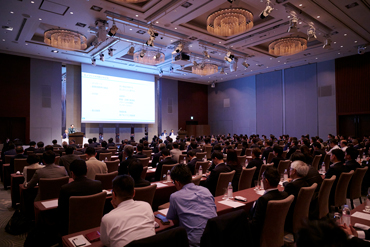
Purchasing policy briefing (May 2023)
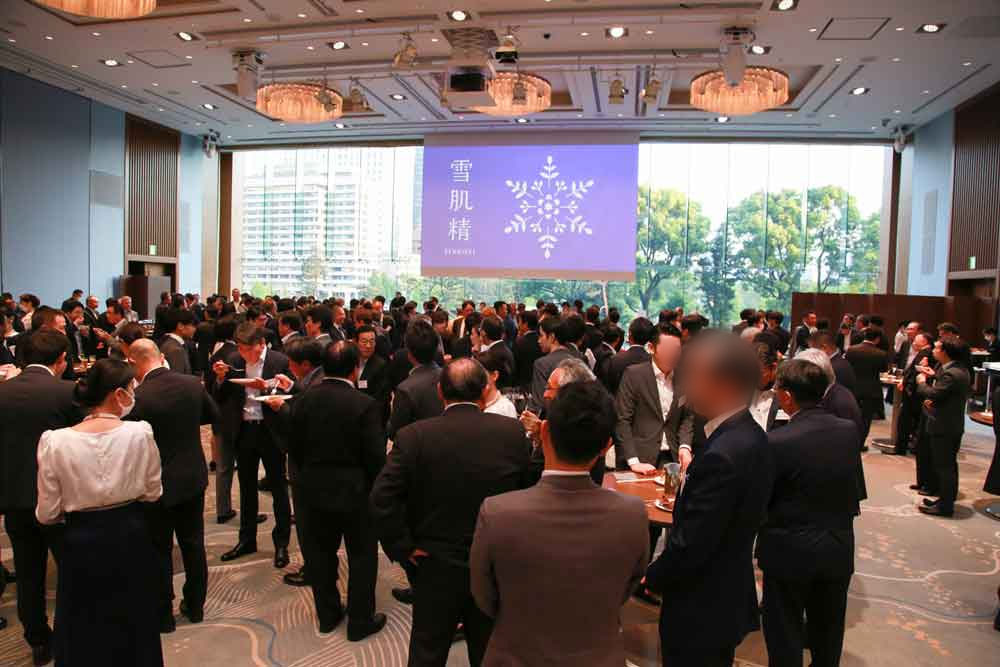
Appreciation party for suppliers (May 2023)
KOSÉ holds an annual purchasing policy briefing meeting to explain the group’s policy, management plan, and purchasing policy, and also holds an appreciation meeting for all participating suppliers, presenting awards to suppliers who have made particularly significant contributions to business performance, quality improvement, environmental friendliness, and other areas.
The FY2024 purchasing policy briefing was held face-to-face as in the previous year, describing management plans and purchasing policies and calling for active cooperation in quality improvement, environmental and sustainability considerations (for 98 companies that represent 86.7% of the purchase amount in FY 2023).
Continuing from last year, we held an appreciation party for suppliers to strengthen our relationships with suppliers including strategic partners.
Number of Suppliers participated in Procurement Policy Briefing: Sustainability data
Factory Inspection
We visit domestic and international suppliers’ facilities as needed. We evaluate and exchange opinions on quality stability, occupational health and safety, environmental measures, and information maintenance, and request improvements in areas that need to be corrected.
Number of Calls to Compliance Consultation Desks: Sustainability data
Contracts with New Dear Suppliers
For new transactions, we examine the research report by an external research firm and conduct on-site audits to ensure that the transaction conforms to our basic procurement policy before entering into a sales transaction agreement and a human rights compliance agreement. If we deem an existing supplier to be high risk due to lack of management stability, violation of social, labor, human rights, environmental, or other laws and regulations, severe quality defects, or nonperformance of the contract with us, we will demand that the supplier correct the situation. If the situation does not improve, transactions with that supplier may be suspended.
♦ You can apply through the web form on the “Materials Procurement Information” page below for cosmetic materials and OEM.
*“High risk” means a lack of management stability, violation of social, labor, human rights, environmental, or other laws and regulations, severe quality defects, or nonperformance of contract, making it difficult for us to continue doing business.
The Basic Procurement Policy(The Material Procurement Information)
Relationship with Production Contractors

KOSÉ’s high quality standards are constantly achieved
When requesting OEM, KOSÉ always maintains a relationship system that ensures KOSÉ’s high quality standards are constantly achieved whenever consigning production externally, whether domestic or abroad. Audits regarding factory environment and processes are conducted based on the GMP standards to guarantee sanitary production whenever consigning production to a new contractor. Quality audits are also regularly conducted thereafter.Through our relationships to maintain high quality, we strive for mutual development with our OEM suppliers.
Identifying Human Rights Issues in the Supply Chain
The close examination of human rights issues that KOSÉ should consider addressing has identified the following issues as important in the supply chain (jointly conducted with the Japan Committee of the CRT from August to October 2021). We will survey the situation and work on these issues in the future.
Ongoing understanding of human rights issues in the raw material procurement supply chain
- Human rights of raw material suppliers: Human rights issues among small-scale farmers producing palm oil
- Working conditions of foreign workers at contract manufacturing sites in Japan
<Survey results of technical interns employed by suppliers>
In January 2024, a questionnaire survey was conducted with 146 suppliers to grasp the employment status of technical interns (response rate: 91.1%).
As a result, 25 companies (18.8%) employed technical interns and 108 companies (81.2%) did not.
Among the 25 companies with actual employment records, the average number of employees was 25 and the maximum was 106.
These 25 companies have confirmed that there are no specific risks associated with the employment of technical interns.
We will continue to engage in due diligence regarding technical interns as an important human rights issue in our supply chain.
Response to Sustainable Palm Oil
Palm oil is a vegetable oil extracted from oil palms produced in Southeast Asia and other regions. It is used in large quantities worldwide for various purposes, including food products, some of which are also widely used as cosmetic ingredients. On the other hand, the destruction of tropical rainforests and human rights issues related to the development of plantations have been identified. Issues related to palm oil have long been raised in the cosmetics industry. KOSÉ recognizes the palm oil issue as a high-risk human right and environmental issue as a cosmetics manufacturer, and is continuously gathering information and addressing this issue.
KOSÉ joined the RSPO in 2019 and is working to adopt certified oils to procure sustainable palm oil. Since 2020, we have also participated in JaSPON, the Japanese Network for Sustainable Palm Oil, and are working with JaSPON members to promote sustainable palm oil procurement and consumption. The Sustainability Strategy, announced in April 2020, sets the following goals and promotes systematic efforts.
[Target] By FY2030, the entire KOSÉ Group aims to procure 100% sustainable palm oil for all palm oil-derived raw materials used in its products.
*RSPO:Roundtable on Sustainable Palm Oil
Results of responsible procurement of palm oil: See KOSÉ Sustainability Strategy Progress Record
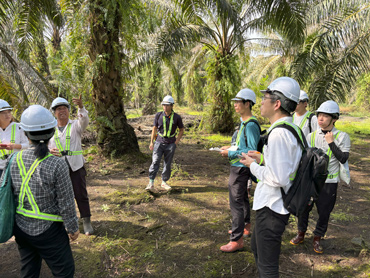
A visit to a small farm in Malaysia to discuss about the operations (November 2023)
After attending the RSPO General Assembly in Thailand in early November 2024, we participated in JaSPON’s research trip to visit small-scale farms and factories in Malaysia, and engaging in dialogue with various stakeholders about the current situation, challenges, and needs in the field to deepen awareness of issues.Going forward, KOSÉ will continue to engage in dialogue with stakeholders.
SCCS Certification *
As part of its commitment to sustainable raw material procurement, KOSÉ has obtained an RSPO Supply Chain Certification for its leading factories in Gunma and Sayama, its head office, and related sites in 2021. In 2024, we were certified under continuous audit and renewed our license.
We will continue to promote the active procurement of RSPO-certified raw materials in the future.
*SCCS Certification: A system that certifies whether the manufacturing, processing, and distribution processes that handle products made with certified palm oil meet the requirements of the SCCS certification.
Activities in Logistics
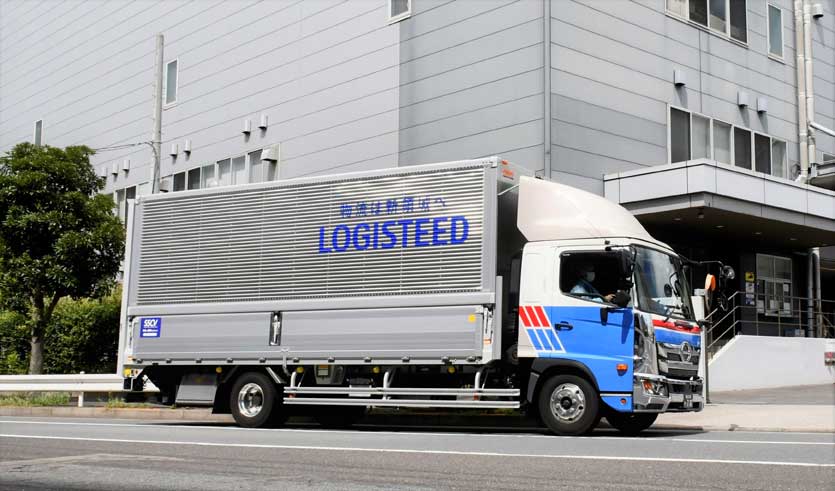
High-quality and efficient logistics services
KOSÉ is outsourcing its domestic logistics operations as part of its business structure reform. As a result, we have successfully improved management efficiency, enhanced the quality of logistics operations, achieved faster response to ever changing logistics needs, and reduced environmental impact by streamlining logistics. We are also making remarkable progress in improving efficiency by jointly using chartered transportation with peer companies and streamlining the loading efficiency of deliveries to distribution centers nationwide. Furthermore, we are promoting modal shift to reduce environmental effects -- we are using railway transport from Kanto region to Hokkaido and Kyushu regions.
In 1997, representatives from the logistics departments of six cosmetics manufacturers participated in the “Cosmetic Logistics Forum 21” and started to implement joint order and delivery in several areas across Japan (Hokkaido, Tohoku, Kita-Kanto, Hokuriku, Chubu, Chugoku, Shikoku, Kyushu, and Okinawa). For all of these areas we are taking part in the joint delivery and contributing to the reduction of work of retailers in receiving goods as well as the reduction of CO2 emissions by decreasing the number of times delivery vehicles have to travel. Steps to further increase the target areas of this activity is ongoing.
Initiatives for work style reform in logistics discussed in the “Logistics 2024 Issue”
- Reduction of truck drivers' waiting time for delivery
Until now, delivery of products and promotional materials to the Mother Center had been guided to the receiving berths in the order of arrival. In February 2024, we introduced the Receiving Berth Management System to reduce the waiting time for truck drivers and optimize the operation of the receiving berths. As a result, the waiting time for delivery has been reduced to the internal standard.
- Expanding modal shift
As part of the expansion of the modal shift, we introduced container transportation from the Kanto area to the Kansai area in the second half of FY2024. We are also contributing to CO2 reduction by promoting logistics GX.
Declaration of voluntary action for the White Logistics Movement
In September 2019, Kosé stated its support for the purposes of the “White Logistics” movement, which aims to secure the logistics necessary for people’s lives and industrial activities, and will take voluntary actions to contribute to the realization of sustainable logistics. In the future, we will continue to actively work on reducing CO2 emissions as well as improving distribution efficiency.
=Kosé Efforts and Activities=
- Proposal and cooperation with suppliers and logistics companies to improve logistics
- Modal shift to ships and railways
- Promotion of joint deliveries
- Respect for the suspension and interruption of operations during abnormal weather to ensure drivers’ safety
- Adopt and promote packaging materials for transportation that reduce environmental impact
*About “White Logistics” movement
In response to the increasingly severe shortage of truck drivers, this movement was led by the Ministry of Land, Infrastructure, Transport and Tourism, the Ministry of Economy, Trade and Industry, and the Ministry of Agriculture, Forestry and Fisheries with the purpose of contributing to economic growth by securing the stable logistics necessary for people’s lives and industrial activities.
“Co-existence and Co-prosperity” with Retailers
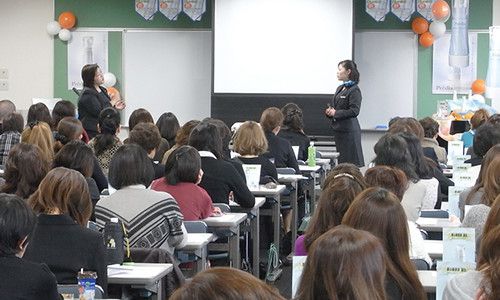
Introductory training on brand characteristics
The KOSÉ group since its foundation has maintained a system of close cooperation with retailers designed not only to provide them with products but also to support their sales efforts, for example, by sending KOSÉ’s beauty advisors out to stores and making proposals about in-store display fixtures. KOSÉ is continuing to strengthen its bond with retailers through the KOSÉ Club, a country-wide organization of retailers, as well as through social events attended by our company’s officers and managers from retailers. Although times are changing with the diversification of distribution and increase in self-service sales through distributors, the spirit of Harmonious Management will never change.
Several seminars are also being held for retailers and their employees to enable them to conduct counseling in their respective stores. Trainings to improve the skills of employees for their careers are conducted. These seminars for the retailers include trainings to promote better understanding of the brand and improve counseling skills.
Retailers are important partners for KOSÉ in improving our relationship with localities. As an example, we collaborated with a retailer to hold a makeup lecture for local elderly people. The KOSÉ Group will continue its efforts in developing trust with our partners and delivering responsive customer service through beauty skills they can depend on.